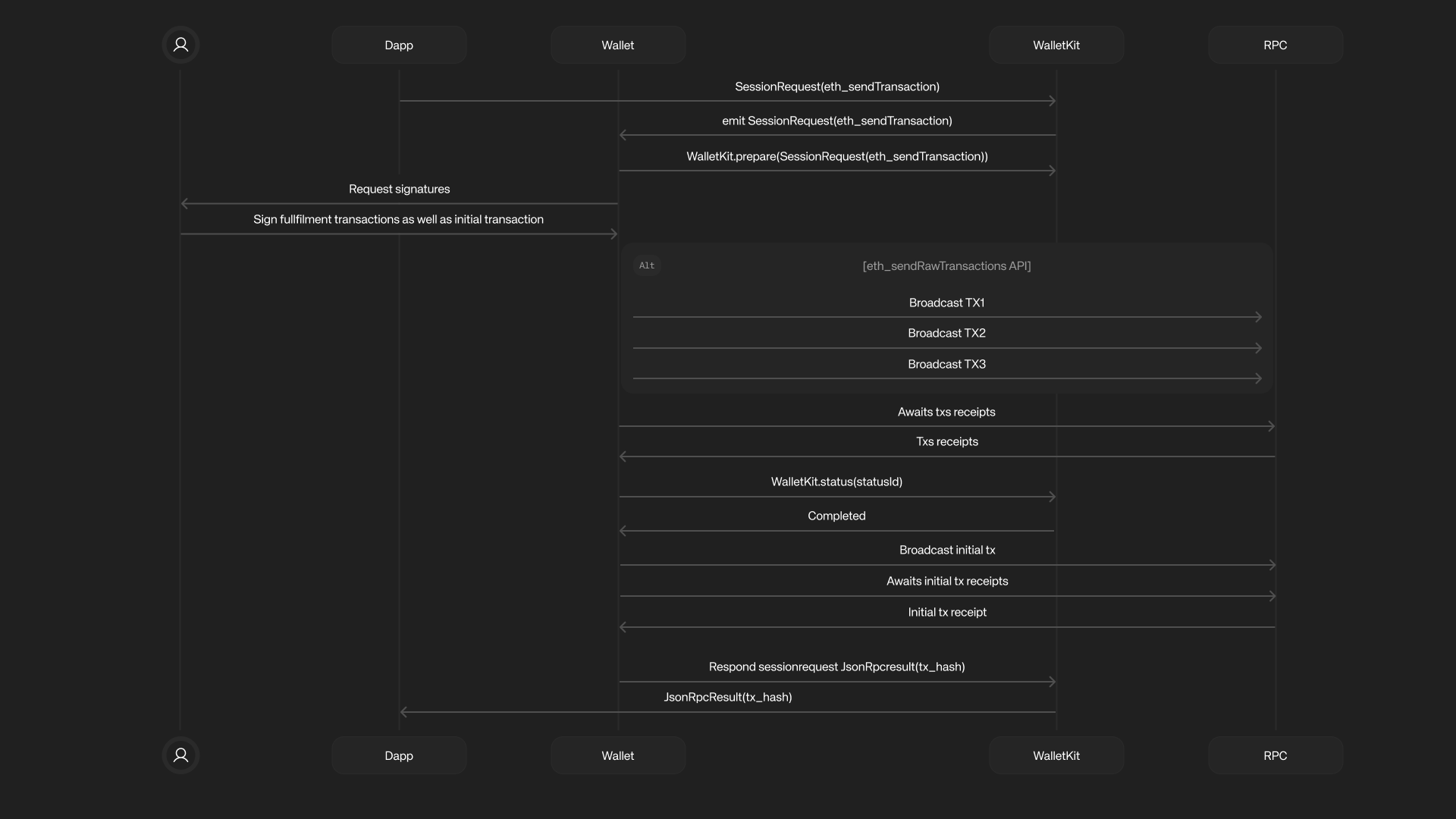Chain Abstraction
Chain Abstraction in WalletKit enables users with stablecoins on any network to spend them on-the-fly on a different network. Our Chain Abstraction solution provides a toolkit for wallet developers to integrate this complex functionality using WalletKit.
For example, when an app requests a 100 USDC payment on Base network but the user only has USDC on Arbitrum, WalletKit offers methods to detect this mismatch, generate necessary transactions, track the cross-chain transfer, and complete the original transaction after bridging finishes.
Chain abstraction is currently in experimental phase and requires the @ChainAbstractionExperimentalApi annotation.
How It Works
When a dapp requests a transaction through eth_sendTransaction, you need to:
- Detect if chain abstraction is needed
- Generate necessary bridging transactions
- Handle transaction execution and monitoring
- Complete the original transaction once bridging is done
The following sequence diagram illustrates the complete flow of a chain abstraction operation, from the initial dapp request to the final transaction confirmation

Methods
Following are the methods from WalletKit that you will use in implementing chain abstraction.
Prepare
This method is used to check if chain abstraction is needed. If it is, it will return a FulfilmentSuccess.Available object with the necessary transactions and funding information.
If it is not, it will return a FulfilmentSuccess.NotRequired object with the original transaction.
@ChainAbstractionExperimentalApi
fun prepare(
transaction: Wallet.Model.Transaction,
onSuccess: (Wallet.Model.FulfilmentSuccess) -> Unit,
onError: (Wallet.Model.FulfilmentError) -> Unit
)
Status
This method is used to check the status of the fulfillment operation. It will return a FulfilmentStatus.Completed object if the operation completed successfully or a FulfilmentStatus.Error object if it encountered an error.
@ChainAbstractionExperimentalApi
fun status(
fulfilmentId: String,
checkIn: Long,
onSuccess: (Wallet.Model.FulfilmentStatus.Completed) -> Unit,
onError: (Wallet.Model.FulfilmentStatus.Error) -> Unit
)
Estimate Fees
This method is used to estimate the fees for the fulfillment operation.
@Throws(Exception::class)
@ChainAbstractionExperimentalApi
fun estimateFees(chainId: String): Wallet.Model.EstimatedFees
Get ERC20 Balance
This method is used to get the balance of an ERC20 token on a specific chain.
@Throws(Exception::class)
@ChainAbstractionExperimentalApi
fun getERC20Balance(chainId: String, tokenAddress: String, ownerAddress: String): String
Get Fulfilment Details
This method is used to get the details of the fulfillment operation.
@ChainAbstractionExperimentalApi
fun getFulfilmentDetails(
available: Wallet.Model.FulfilmentSuccess.Available,
initTransaction: Wallet.Model.Transaction,
onSuccess: (Wallet.Model.FulfilmentDetails) -> Unit,
onError: (Wallet.Model.Error) -> Unit
)
Usage
When your wallet receives an eth_sendTransaction request, first check if chain abstraction is needed using the prepare method, if it is, you need to sign all the fulfilment transactions and broadcast them in parallel.
After that, you need to call the status method to check the status of the fulfillment operation.
If the operation is successful, you need to broadcast the initial transaction and await for the transaction hash and receipt. If the operation is not successful, you need to send the JsonRpcError to the dapp and display the error to the user.
override fun onSessionRequest(sessionRequest: Wallet.Model.SessionRequest, verifyContext: Wallet.Model.VerifyContext) {
if (sessionRequest.request.method == "eth_sendTransaction") {
val initialTransaction = Wallet.Model.Transaction(...)
WalletKit.prepare(
initialTransaction,
onSuccess = { fulfilmentSuccess ->
when (fulfilmentSuccess) {
is Wallet.Model.FulfilmentSuccess.Available -> {
//Sign all the fulfilment transactions
//Broadcast the fulfilment transactions in parallel
//Await for the transaction hashes and receipts
//Call the fulfillmentStatus
WalletKit.status(fulfilmentId, checkIn,
onSuccess = {
//Successfull filfilment
//Broadcast the inittial transaction
//Await for the tx hash ande receipt
//Send the response to the Dapp
},
onError = {
//Fulfilment error - wallet should send the JsonRpcError to a dapp for given request and display error to the user
}
)
}
is Wallet.Model.FulfilmentSuccess.NotRequired -> {
//Chain abstraction is not required, handle transaction as usual
}
}
},
onError = { fulfilmentError ->
// One of the possible errors: NoRoutesAvailable, InsufficientFunds, InsufficientGasFunds - wallet should send the JsonRpcError to a dapp for given request and display error to the user
}
)
} else {
// Handle transaction as usual
}
}
Types
Following are the types that are used in the chain abstraction methods.
data class Transaction(
var from: String,
var data: String,
var nonce: String,
var maxFeePerGas: String,
var maxPriorityFeePerGas: String,
var chainId: String
)
sealed class FulfilmentSuccess : Model() {
data class Available(
val fulfilmentId: String,
val checkIn: Long,
val transactions: List<Transaction>,
val initialTransaction: Transaction,
val initialTransactionMetadata: InitialTransactionMetadata,
val funding: List<FundingMetadata>
) : FulfilmentSuccess()
data class NotRequired(val initialTransaction: Transaction) : FulfilmentSuccess()
}
data class InitialTransactionMetadata(
var symbol: String,
var amount: String,
var decimals: Int,
var tokenContract: String,
var transferTo: String
)
data class FundingMetadata(
var chainId: String,
var tokenContract: String,
var symbol: String,
var amount: String,
var bridgingFee: String,
var decimals: Int
)
sealed class FulfilmentError : Model() {
data object NoRoutesAvailable : FulfilmentError()
data object InsufficientFunds : FulfilmentError()
data object InsufficientGasFunds : FulfilmentError()
data class Unknown(val message: String) : FulfilmentError()
}
sealed class FulfilmentStatus : Model() {
data class Completed(val createdAt: Long) : FulfilmentStatus()
data class Error(val reason: String) : FulfilmentStatus()
}
sealed class FulfilmentStatus : Model() {
data class Completed(val createdAt: Long) : FulfilmentStatus()
data class Error(val reason: String) : FulfilmentStatus()
}
data class FulfilmentDetails(
var fulfilmentDetails: List<TransactionDetails>,
var initialDetails: TransactionDetails,
var bridgeDetails: List<TransactionFee>,
var localTotal: Amount
)
data class TransactionDetails(
var transaction: Transaction,
var eip1559: EstimatedFees,
var transactionFee: TransactionFee
)
data class TransactionFee(
var fee: Amount,
var localFee: Amount
)
data class Amount(
var symbol: String,
var amount: String,
var unit: String,
var formatted: String,
var formattedAlt: String
)
For implementation examples, check our sample wallet implementation with Kotlin.